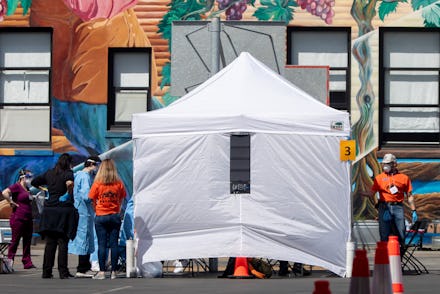Coronavirus led to the biggest increase in uninsured people on record

A whopping 5.4 million people in the U.S. lost their jobs and, by extension, their health insurance between February and May because of the coronavirus pandemic, a study published Tuesday by Families USA found. The numbers make for the highest annual increase in the number of uninsured people ever recorded — 39% higher than the 2008 Great Recession, during which 3.9 million adults lost their health insurance.
"The greatest public health crisis in a century has caused the deepest economic crash since World War II," the study reads. "In a few short months, millions of workers lost their jobs. At least 16 million of them simultaneously lost access to health insurance formerly furnished by their employers." The numbers are stark, and still don't take into account family members covered on a parent's insurance plan.
While millions of people lost access to employer-provided health coverage during a global health crisis, Congress has still not taken action to address the gap, the report criticizes. "No COVID-19 legislation yet signed into law has made a serious effort to protect comprehensive health insurance," wrote Stan Dorn, director of the National Center for Coverage Innovation at Families USA.
The impact hasn't been the same across states. In eight states, at least 20% of adults are now uninsured, and in five states the number of uninsured adults increased by at least 40% Massachusetts saw the number of uninsured adults rise by highest amount — 93 percent — followed by Hawaii, Rhode Island, Michigan, and New Hampshire.
Without health care coverage, affording treatment for coronavirus would be extraordinarily expensive — let alone treatment for anything else, or even routine medications — compounding the financial pressures of navigating and surviving a pandemic while unemployed. The report highlights that states where unemployment has risen are also ones where public health safety measures have been the most relaxed, often in direct contradiction to Centers for Disease Control recommendations. For instance, in Florida, 25% of adults lack access to health insurance; the state currently has the second highest coronavirus infection rate, just behind Arizona.
While coverage loss harms individuals and families most immediately, the report underlines that mass health insurance loss is a public health crisis. Without heath care coverage, individuals are less likely to seek testing or care, which can increase the rate of COVID-19 transmission if people are walking around with the virus unknowingly. Dorn wrote that health care coverage protects individuals against financial strain, in that families without coverage may have to choose between purchasing food and other necessary expenses. Insurance coverage also "saves jobs by providing revenue for hospitals, doctors, clinics, and other health care providers, which together employ 1 in 7 private sector workers," Dorn wrote.
The Kaiser Family Foundation wrote in May that newly-unemployed individuals might be able to retain health insurance through Medicaid or via the Affordable Care Act marketplace. However, in states that have not expanded Medicaid to cover those in the "coverage gap" (those who make too much to qualify for Medicaid but make too little to purchase care on their own), those without employer-provided coverage are likely to struggle.